Reflection Paper: Personal Perspectives on Criminal Justice
VerifiedAdded on 2023/04/11
|6
|1192
|356
Essay
AI Summary
This reflection paper delves into a student's evolving perspectives on the criminal justice system, shaped by personal values, education, and childhood experiences. The essay begins with a reflection on the student's fascination with the courts and the role of a judge, highlighting formative influences like a television program and observations of neighborhood delinquency. The student's attitude towards a criminal justice career has evolved since starting university, gaining a deeper conceptual understanding of the field. The paper then explores the student's beliefs about the causes of crime, citing factors like greed, poverty, and societal issues, alongside academic perspectives including ecological, societal, and biological factors. The student aligns with the deterrence theory of punishment, which informs their career aspiration of working in the court as a judge. The paper also reflects on how cultural values and education have influenced the student's perspectives on crime, which have matured over time. Finally, the student discusses the emergence of their professional identity, shaped by their experiences and aspirations within the field of criminology.
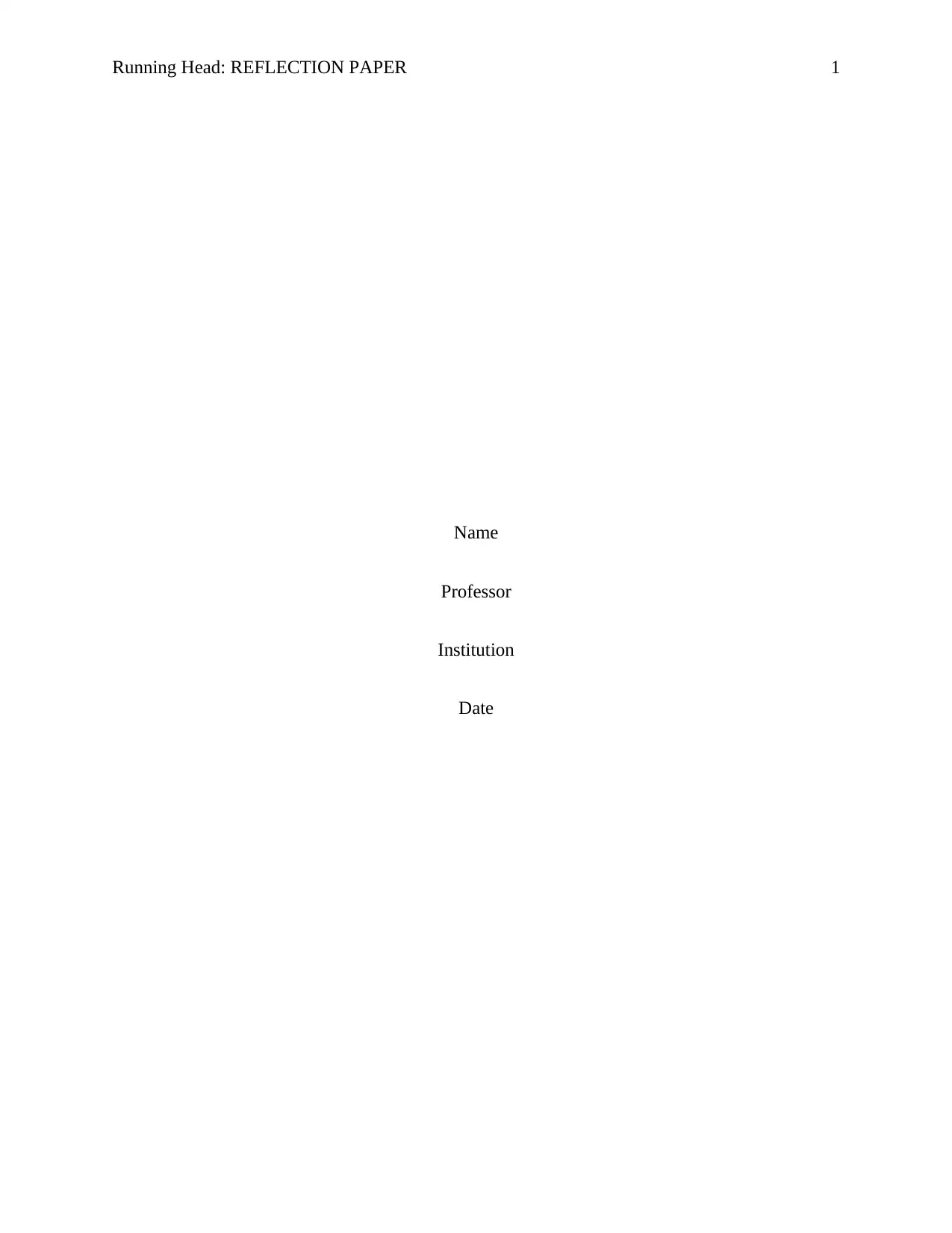
Running Head: REFLECTION PAPER 1
Name
Professor
Institution
Date
Name
Professor
Institution
Date
Paraphrase This Document
Need a fresh take? Get an instant paraphrase of this document with our AI Paraphraser
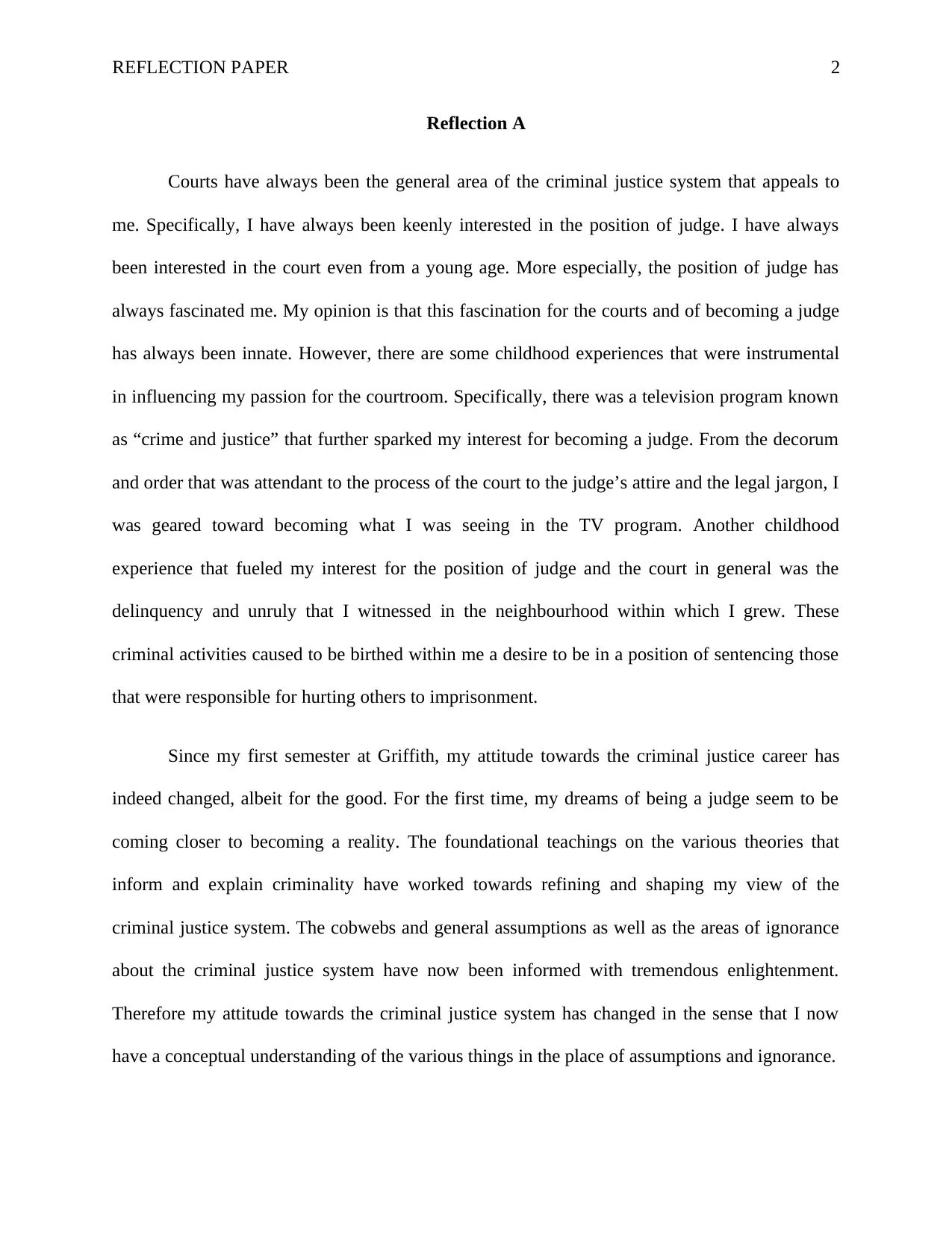
REFLECTION PAPER 2
Reflection A
Courts have always been the general area of the criminal justice system that appeals to
me. Specifically, I have always been keenly interested in the position of judge. I have always
been interested in the court even from a young age. More especially, the position of judge has
always fascinated me. My opinion is that this fascination for the courts and of becoming a judge
has always been innate. However, there are some childhood experiences that were instrumental
in influencing my passion for the courtroom. Specifically, there was a television program known
as “crime and justice” that further sparked my interest for becoming a judge. From the decorum
and order that was attendant to the process of the court to the judge’s attire and the legal jargon, I
was geared toward becoming what I was seeing in the TV program. Another childhood
experience that fueled my interest for the position of judge and the court in general was the
delinquency and unruly that I witnessed in the neighbourhood within which I grew. These
criminal activities caused to be birthed within me a desire to be in a position of sentencing those
that were responsible for hurting others to imprisonment.
Since my first semester at Griffith, my attitude towards the criminal justice career has
indeed changed, albeit for the good. For the first time, my dreams of being a judge seem to be
coming closer to becoming a reality. The foundational teachings on the various theories that
inform and explain criminality have worked towards refining and shaping my view of the
criminal justice system. The cobwebs and general assumptions as well as the areas of ignorance
about the criminal justice system have now been informed with tremendous enlightenment.
Therefore my attitude towards the criminal justice system has changed in the sense that I now
have a conceptual understanding of the various things in the place of assumptions and ignorance.
Reflection A
Courts have always been the general area of the criminal justice system that appeals to
me. Specifically, I have always been keenly interested in the position of judge. I have always
been interested in the court even from a young age. More especially, the position of judge has
always fascinated me. My opinion is that this fascination for the courts and of becoming a judge
has always been innate. However, there are some childhood experiences that were instrumental
in influencing my passion for the courtroom. Specifically, there was a television program known
as “crime and justice” that further sparked my interest for becoming a judge. From the decorum
and order that was attendant to the process of the court to the judge’s attire and the legal jargon, I
was geared toward becoming what I was seeing in the TV program. Another childhood
experience that fueled my interest for the position of judge and the court in general was the
delinquency and unruly that I witnessed in the neighbourhood within which I grew. These
criminal activities caused to be birthed within me a desire to be in a position of sentencing those
that were responsible for hurting others to imprisonment.
Since my first semester at Griffith, my attitude towards the criminal justice career has
indeed changed, albeit for the good. For the first time, my dreams of being a judge seem to be
coming closer to becoming a reality. The foundational teachings on the various theories that
inform and explain criminality have worked towards refining and shaping my view of the
criminal justice system. The cobwebs and general assumptions as well as the areas of ignorance
about the criminal justice system have now been informed with tremendous enlightenment.
Therefore my attitude towards the criminal justice system has changed in the sense that I now
have a conceptual understanding of the various things in the place of assumptions and ignorance.
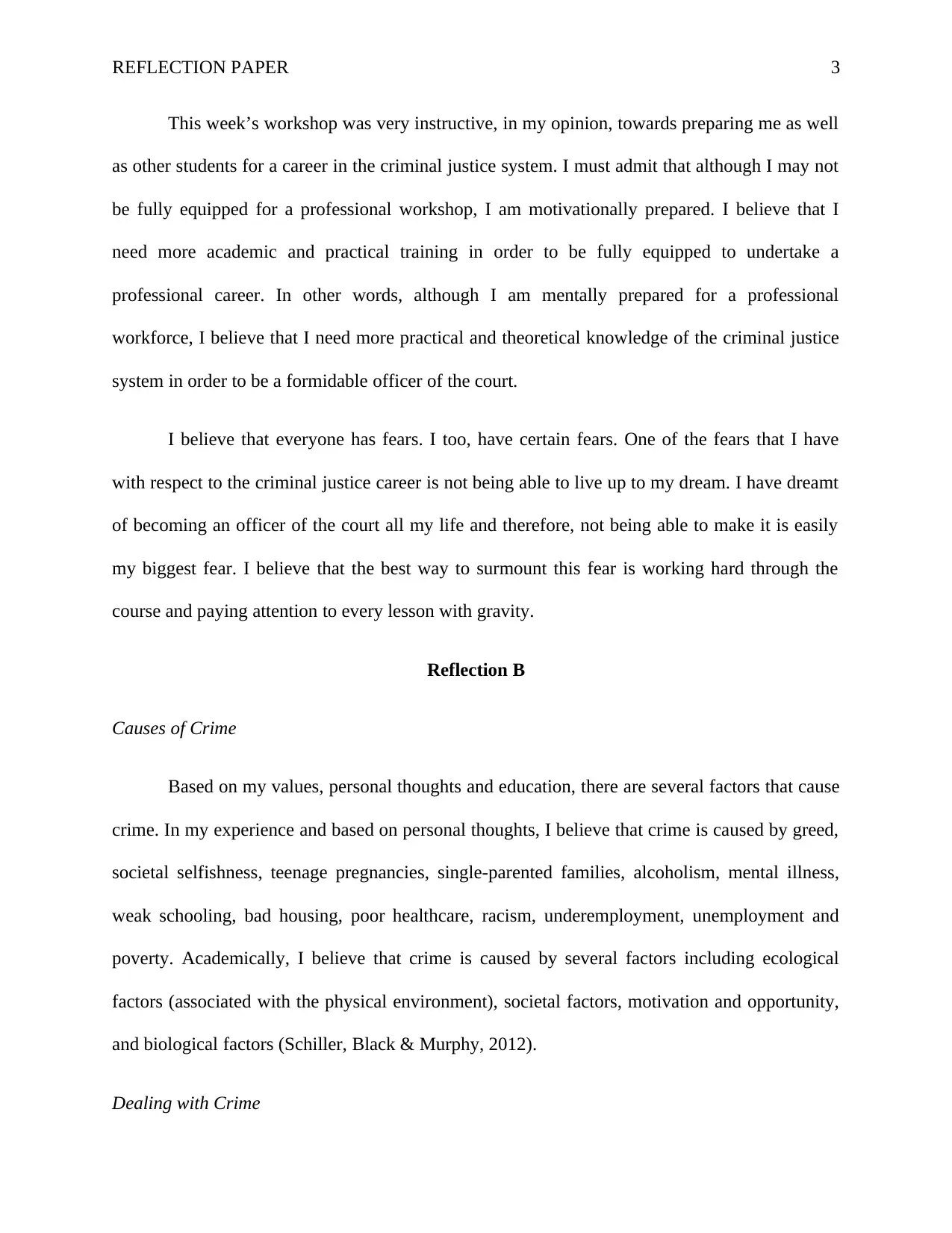
REFLECTION PAPER 3
This week’s workshop was very instructive, in my opinion, towards preparing me as well
as other students for a career in the criminal justice system. I must admit that although I may not
be fully equipped for a professional workshop, I am motivationally prepared. I believe that I
need more academic and practical training in order to be fully equipped to undertake a
professional career. In other words, although I am mentally prepared for a professional
workforce, I believe that I need more practical and theoretical knowledge of the criminal justice
system in order to be a formidable officer of the court.
I believe that everyone has fears. I too, have certain fears. One of the fears that I have
with respect to the criminal justice career is not being able to live up to my dream. I have dreamt
of becoming an officer of the court all my life and therefore, not being able to make it is easily
my biggest fear. I believe that the best way to surmount this fear is working hard through the
course and paying attention to every lesson with gravity.
Reflection B
Causes of Crime
Based on my values, personal thoughts and education, there are several factors that cause
crime. In my experience and based on personal thoughts, I believe that crime is caused by greed,
societal selfishness, teenage pregnancies, single-parented families, alcoholism, mental illness,
weak schooling, bad housing, poor healthcare, racism, underemployment, unemployment and
poverty. Academically, I believe that crime is caused by several factors including ecological
factors (associated with the physical environment), societal factors, motivation and opportunity,
and biological factors (Schiller, Black & Murphy, 2012).
Dealing with Crime
This week’s workshop was very instructive, in my opinion, towards preparing me as well
as other students for a career in the criminal justice system. I must admit that although I may not
be fully equipped for a professional workshop, I am motivationally prepared. I believe that I
need more academic and practical training in order to be fully equipped to undertake a
professional career. In other words, although I am mentally prepared for a professional
workforce, I believe that I need more practical and theoretical knowledge of the criminal justice
system in order to be a formidable officer of the court.
I believe that everyone has fears. I too, have certain fears. One of the fears that I have
with respect to the criminal justice career is not being able to live up to my dream. I have dreamt
of becoming an officer of the court all my life and therefore, not being able to make it is easily
my biggest fear. I believe that the best way to surmount this fear is working hard through the
course and paying attention to every lesson with gravity.
Reflection B
Causes of Crime
Based on my values, personal thoughts and education, there are several factors that cause
crime. In my experience and based on personal thoughts, I believe that crime is caused by greed,
societal selfishness, teenage pregnancies, single-parented families, alcoholism, mental illness,
weak schooling, bad housing, poor healthcare, racism, underemployment, unemployment and
poverty. Academically, I believe that crime is caused by several factors including ecological
factors (associated with the physical environment), societal factors, motivation and opportunity,
and biological factors (Schiller, Black & Murphy, 2012).
Dealing with Crime
⊘ This is a preview!⊘
Do you want full access?
Subscribe today to unlock all pages.

Trusted by 1+ million students worldwide
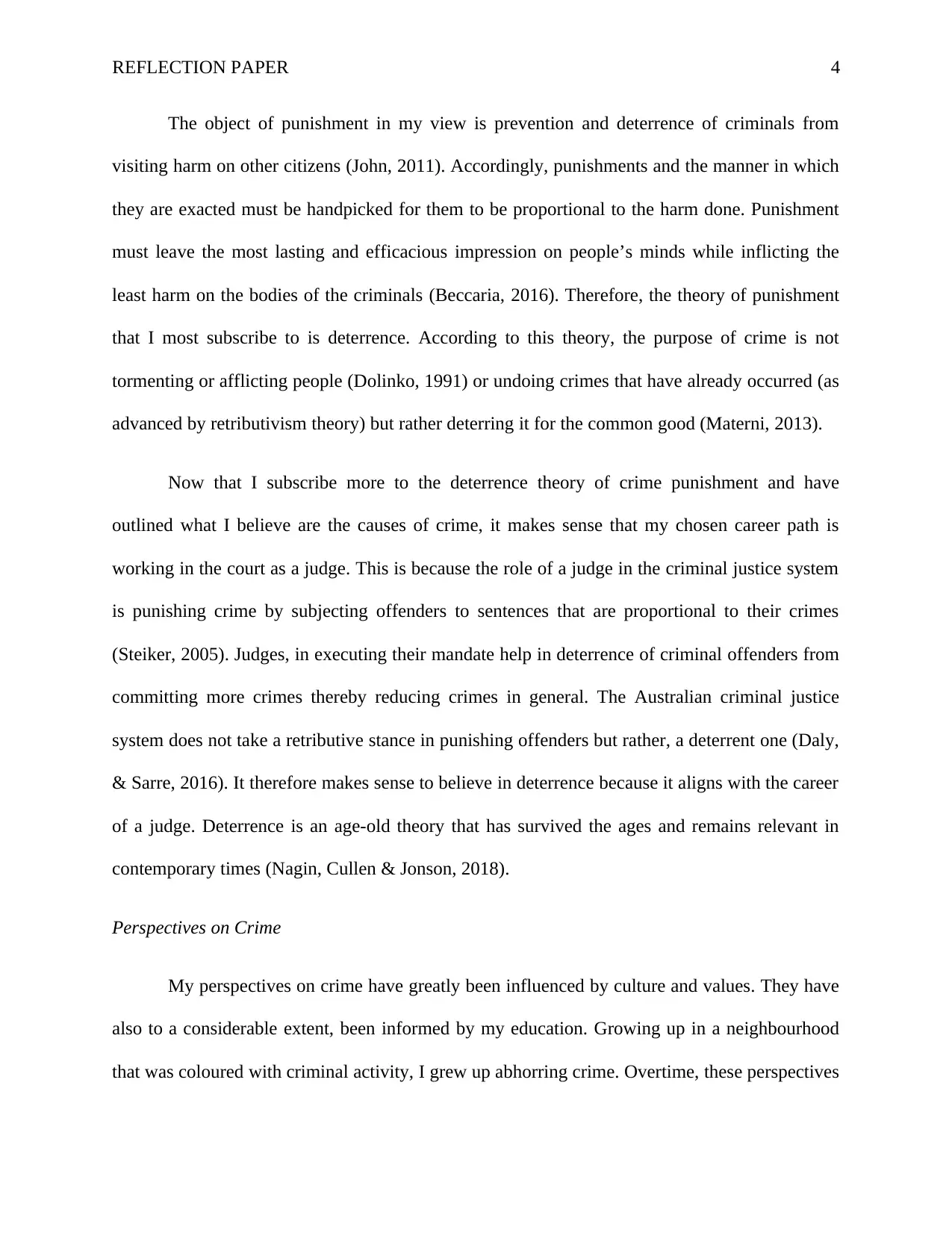
REFLECTION PAPER 4
The object of punishment in my view is prevention and deterrence of criminals from
visiting harm on other citizens (John, 2011). Accordingly, punishments and the manner in which
they are exacted must be handpicked for them to be proportional to the harm done. Punishment
must leave the most lasting and efficacious impression on people’s minds while inflicting the
least harm on the bodies of the criminals (Beccaria, 2016). Therefore, the theory of punishment
that I most subscribe to is deterrence. According to this theory, the purpose of crime is not
tormenting or afflicting people (Dolinko, 1991) or undoing crimes that have already occurred (as
advanced by retributivism theory) but rather deterring it for the common good (Materni, 2013).
Now that I subscribe more to the deterrence theory of crime punishment and have
outlined what I believe are the causes of crime, it makes sense that my chosen career path is
working in the court as a judge. This is because the role of a judge in the criminal justice system
is punishing crime by subjecting offenders to sentences that are proportional to their crimes
(Steiker, 2005). Judges, in executing their mandate help in deterrence of criminal offenders from
committing more crimes thereby reducing crimes in general. The Australian criminal justice
system does not take a retributive stance in punishing offenders but rather, a deterrent one (Daly,
& Sarre, 2016). It therefore makes sense to believe in deterrence because it aligns with the career
of a judge. Deterrence is an age-old theory that has survived the ages and remains relevant in
contemporary times (Nagin, Cullen & Jonson, 2018).
Perspectives on Crime
My perspectives on crime have greatly been influenced by culture and values. They have
also to a considerable extent, been informed by my education. Growing up in a neighbourhood
that was coloured with criminal activity, I grew up abhorring crime. Overtime, these perspectives
The object of punishment in my view is prevention and deterrence of criminals from
visiting harm on other citizens (John, 2011). Accordingly, punishments and the manner in which
they are exacted must be handpicked for them to be proportional to the harm done. Punishment
must leave the most lasting and efficacious impression on people’s minds while inflicting the
least harm on the bodies of the criminals (Beccaria, 2016). Therefore, the theory of punishment
that I most subscribe to is deterrence. According to this theory, the purpose of crime is not
tormenting or afflicting people (Dolinko, 1991) or undoing crimes that have already occurred (as
advanced by retributivism theory) but rather deterring it for the common good (Materni, 2013).
Now that I subscribe more to the deterrence theory of crime punishment and have
outlined what I believe are the causes of crime, it makes sense that my chosen career path is
working in the court as a judge. This is because the role of a judge in the criminal justice system
is punishing crime by subjecting offenders to sentences that are proportional to their crimes
(Steiker, 2005). Judges, in executing their mandate help in deterrence of criminal offenders from
committing more crimes thereby reducing crimes in general. The Australian criminal justice
system does not take a retributive stance in punishing offenders but rather, a deterrent one (Daly,
& Sarre, 2016). It therefore makes sense to believe in deterrence because it aligns with the career
of a judge. Deterrence is an age-old theory that has survived the ages and remains relevant in
contemporary times (Nagin, Cullen & Jonson, 2018).
Perspectives on Crime
My perspectives on crime have greatly been influenced by culture and values. They have
also to a considerable extent, been informed by my education. Growing up in a neighbourhood
that was coloured with criminal activity, I grew up abhorring crime. Overtime, these perspectives
Paraphrase This Document
Need a fresh take? Get an instant paraphrase of this document with our AI Paraphraser
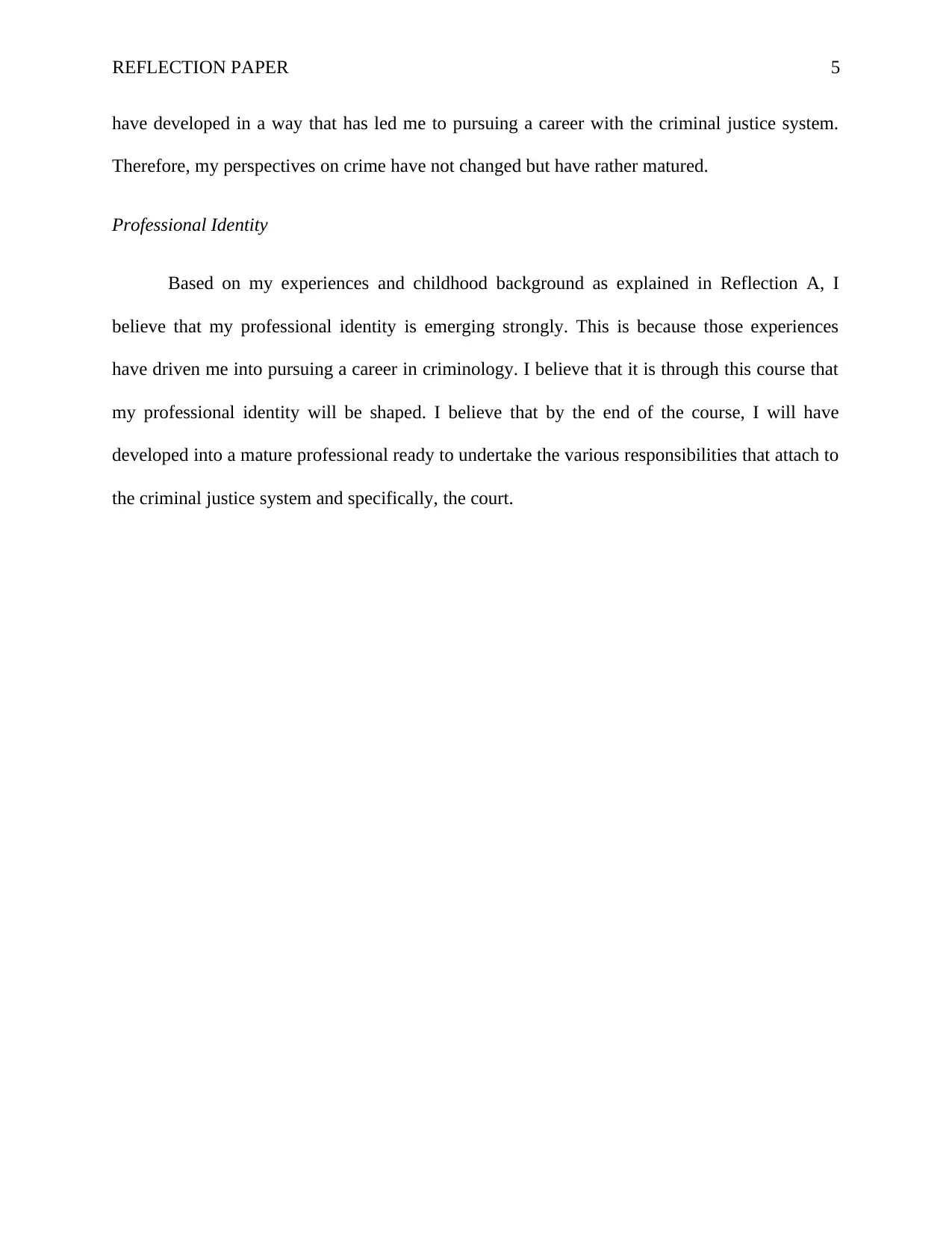
REFLECTION PAPER 5
have developed in a way that has led me to pursuing a career with the criminal justice system.
Therefore, my perspectives on crime have not changed but have rather matured.
Professional Identity
Based on my experiences and childhood background as explained in Reflection A, I
believe that my professional identity is emerging strongly. This is because those experiences
have driven me into pursuing a career in criminology. I believe that it is through this course that
my professional identity will be shaped. I believe that by the end of the course, I will have
developed into a mature professional ready to undertake the various responsibilities that attach to
the criminal justice system and specifically, the court.
have developed in a way that has led me to pursuing a career with the criminal justice system.
Therefore, my perspectives on crime have not changed but have rather matured.
Professional Identity
Based on my experiences and childhood background as explained in Reflection A, I
believe that my professional identity is emerging strongly. This is because those experiences
have driven me into pursuing a career in criminology. I believe that it is through this course that
my professional identity will be shaped. I believe that by the end of the course, I will have
developed into a mature professional ready to undertake the various responsibilities that attach to
the criminal justice system and specifically, the court.
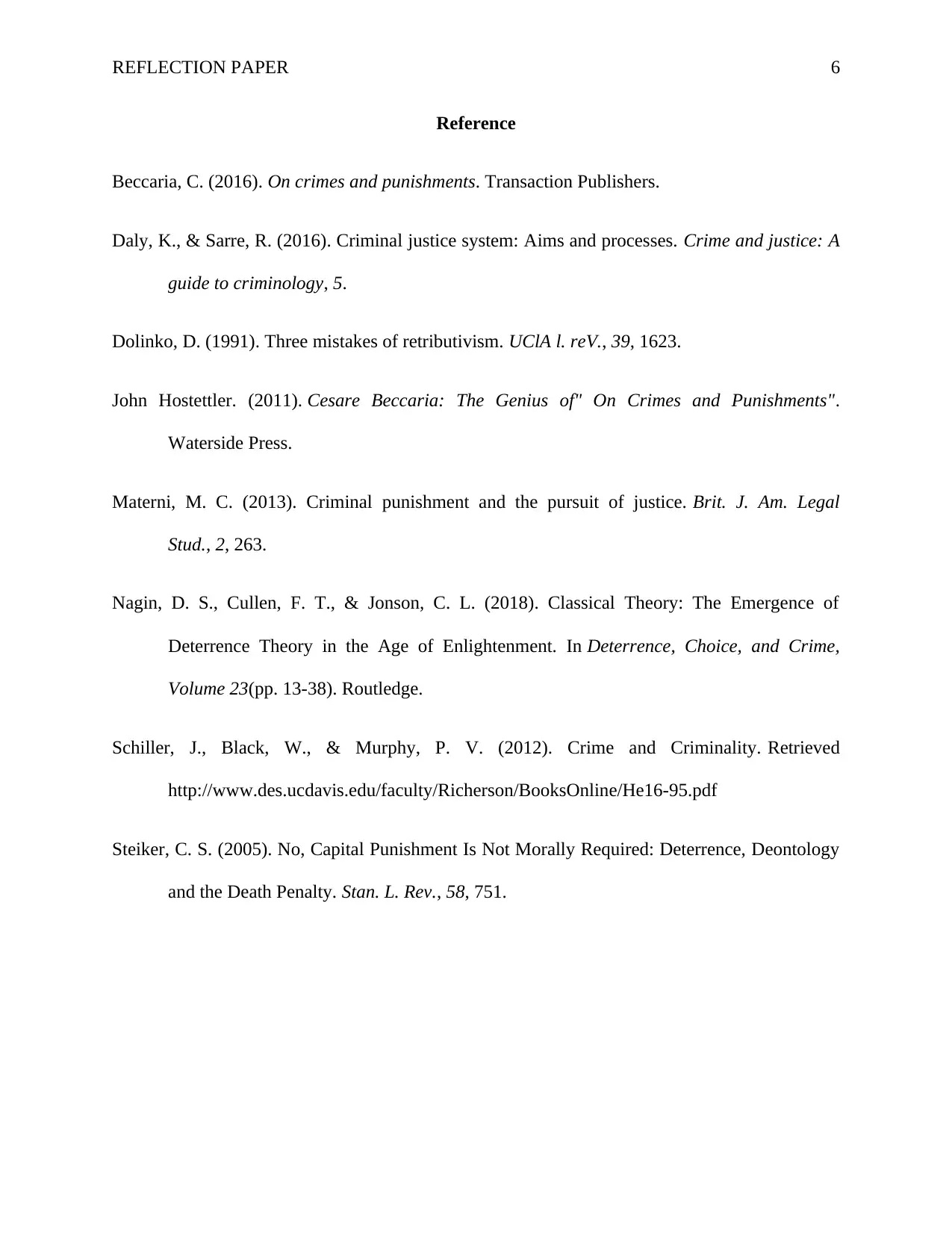
REFLECTION PAPER 6
Reference
Beccaria, C. (2016). On crimes and punishments. Transaction Publishers.
Daly, K., & Sarre, R. (2016). Criminal justice system: Aims and processes. Crime and justice: A
guide to criminology, 5.
Dolinko, D. (1991). Three mistakes of retributivism. UClA l. reV., 39, 1623.
John Hostettler. (2011). Cesare Beccaria: The Genius of" On Crimes and Punishments".
Waterside Press.
Materni, M. C. (2013). Criminal punishment and the pursuit of justice. Brit. J. Am. Legal
Stud., 2, 263.
Nagin, D. S., Cullen, F. T., & Jonson, C. L. (2018). Classical Theory: The Emergence of
Deterrence Theory in the Age of Enlightenment. In Deterrence, Choice, and Crime,
Volume 23(pp. 13-38). Routledge.
Schiller, J., Black, W., & Murphy, P. V. (2012). Crime and Criminality. Retrieved
http://www.des.ucdavis.edu/faculty/Richerson/BooksOnline/He16-95.pdf
Steiker, C. S. (2005). No, Capital Punishment Is Not Morally Required: Deterrence, Deontology
and the Death Penalty. Stan. L. Rev., 58, 751.
Reference
Beccaria, C. (2016). On crimes and punishments. Transaction Publishers.
Daly, K., & Sarre, R. (2016). Criminal justice system: Aims and processes. Crime and justice: A
guide to criminology, 5.
Dolinko, D. (1991). Three mistakes of retributivism. UClA l. reV., 39, 1623.
John Hostettler. (2011). Cesare Beccaria: The Genius of" On Crimes and Punishments".
Waterside Press.
Materni, M. C. (2013). Criminal punishment and the pursuit of justice. Brit. J. Am. Legal
Stud., 2, 263.
Nagin, D. S., Cullen, F. T., & Jonson, C. L. (2018). Classical Theory: The Emergence of
Deterrence Theory in the Age of Enlightenment. In Deterrence, Choice, and Crime,
Volume 23(pp. 13-38). Routledge.
Schiller, J., Black, W., & Murphy, P. V. (2012). Crime and Criminality. Retrieved
http://www.des.ucdavis.edu/faculty/Richerson/BooksOnline/He16-95.pdf
Steiker, C. S. (2005). No, Capital Punishment Is Not Morally Required: Deterrence, Deontology
and the Death Penalty. Stan. L. Rev., 58, 751.
⊘ This is a preview!⊘
Do you want full access?
Subscribe today to unlock all pages.

Trusted by 1+ million students worldwide
1 out of 6
Related Documents
Your All-in-One AI-Powered Toolkit for Academic Success.
+13062052269
info@desklib.com
Available 24*7 on WhatsApp / Email
![[object Object]](/_next/static/media/star-bottom.7253800d.svg)
Unlock your academic potential
Copyright © 2020–2026 A2Z Services. All Rights Reserved. Developed and managed by ZUCOL.





